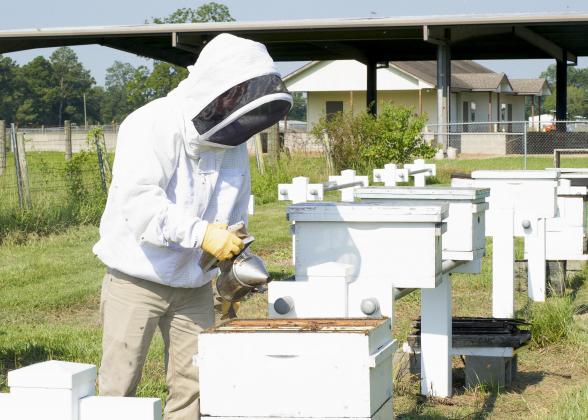
By Tobie Blanchard
BATON ROUGE — LSU AgCenter entomologists Kristen Healy and Daniel Swale received nearly a million dollars from the U.S. Department of Agriculture National Institute of Food and Agriculture to study honeybee health.
The LSU AgCenter is one of seven universities to receive part of $6.8 million the USDA is investing in pollinators. The AgCenter portion is $935,000.
Healy and Swale are conducting research on how stress factors affect honeybees. They are working with researchers at the USDA Honey Bee Breeding, Genetics and Physiology Research Unit in Baton Rouge and the largest beekeeper in the country to do a two-year study following 400 hives.
Healy’s work focuses on mites and the pathogens they transmit.
“We will divide the hives into cohort groups. One group will be treated for mites with a mite control product and the other will receive no treatment,” Healy said.
The bees also will be divided by location. Some bees will be moved to different locations for pollination services. The population the researchers are working with is currently in South Dakota, but some hives will move to California in the fall for almond pollination and then to Mississippi in late winter.
“We also want to see if it is a stress factor to move them,” Healy said.
Swale is studying the physiology of bees, which could suffer from the relocations.
“The transcontinental movement of the bees may force them to spend more energy and deplete their storage of nutrient-rich lipids, or fats,” Swale said. “We are interested in determining if the bees have reduced amount of fat after each relocation event. If they do, we then want to ask if we can enhance the amount of fat in each bee.”
Reduced fat storage can decrease the bees’ chances of survival, Swale said. He will also study oxidative stress levels and see if there is a way to mitigate the development of the damaging reactive oxygen species in the bees’ systems.
The researchers also are interested in deformed wing virus, which is present in many colonies, and trying to understand its transmission.
Healy said they will be sampling pollen, nectar and bees from hives during and at the end of the study.
“We can look at which colonies failed and which ones didn’t and quantify which stress variables were more important to the relative health of the bees,” Healy said.
The grant also includes an extension component so the researchers can determine the best methods to get bee health information to beekeepers and the public.
The USDA estimates honeybees pollinate $15 billion worth of crops. U.S. Secretary of Agriculture Sonny Perdue declared June 19-25 as National Pollinator Week.
